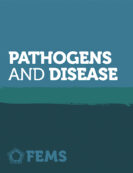FEMS Microbiology Ecology Poster Prize: Haotian Wang
We send our congratulations to Haotian Wang, who won the Best Poster Award at the 4th Conference on Ecology of Soil Microorganisms. This Poster Prize is sponsored by our journal FEMS Microbiology Ecology.
 The 4th Ecology of Soil Microorganisms meeting occurred on 19 – 23 June 2022 in Prague, Czech Republic. The theme was be “Microbes as Important Drivers of Soil Processes”. There is a Thematic Issue connected to this meeting which will focus on the role of soil microorganisms in ecosystem processes such as decomposition, biogeochemistry and nutrient cycling, microbiomes of natural and managed soils and interactions of microorganisms with plants and other macro-organisms. More information about the Ecology of Soil Microorganisms Thematic Issue here.
The 4th Ecology of Soil Microorganisms meeting occurred on 19 – 23 June 2022 in Prague, Czech Republic. The theme was be “Microbes as Important Drivers of Soil Processes”. There is a Thematic Issue connected to this meeting which will focus on the role of soil microorganisms in ecosystem processes such as decomposition, biogeochemistry and nutrient cycling, microbiomes of natural and managed soils and interactions of microorganisms with plants and other macro-organisms. More information about the Ecology of Soil Microorganisms Thematic Issue here.
What is your current position, and what was your scientific journey to get there?
I am currently a Ph.D. student at the Christoph Tebbe research group at the Thünen Institute of Braunschweig in Germany. I got my bachelor’s and master’s degrees in China at the Fujian Agriculture and Forestry University and University of Chinese Academy of Sciences, respectively. My research aims to develop a peptide nucleic acid to suppress amplification of soil fungal DNA for studying soil protistan communities”
Could you describe the research your poster covered?
During the past decades, studies on the diversity of unicellular soil-inhabiting eukaryotes (protists) strongly relied on analyzing PCR-DNA sequences amplified with primers binding to phylogenetically highly conserved regions of the 18S rRNA gene. However, in soil, fungal sequences usually represent the dominant 18S rRNA genes and thereby predominate in such amplicon libraries. We initiated this study by designing and utilizing a peptide nucleic acid (PNA) to inhibit PCR amplification of soil fungal DNA. Our PNA probe PNA treatment significantly increased the soil protistan α-diversity, and it also altered the detectable soil protistan community structure. More important, the use of the PNA probe helped to identify more under-represented Amoebozoa when using universal eukaryotic primers for studying protists. We thereby conclude that our PNA probe can be a useful tool for enhancing the detection of protistan diversity in soils.”
What do you hope to focus your research on in the future?
I would hope to focus on unravelling the bacteria and protistan predator-prey interactions determining soil functioning as most studies have focused on soil bacteria and fungi, while protists have received much less attention despite the important roles they play, I would love to continue working in the field of soil protists throughout my career.”
–
We use income from the FEMS Journals to fund grants, awards, and projects, and to support our knowledge sharing events and initiatives. Consider publishing your research with our journals to help the global microbiology community.
All but one of the FEMS journals are now fully open access (OA), with one journal, FEMS Microbiology Letters remaining a subscription journal with free-to-publish and OA options. Open access is key to supporting the FEMS mission of disseminating high quality research as widely as possible: when high quality, peer reviewed sound science is open access, anyone, anywhere in the world with an internet connection, can read it.







